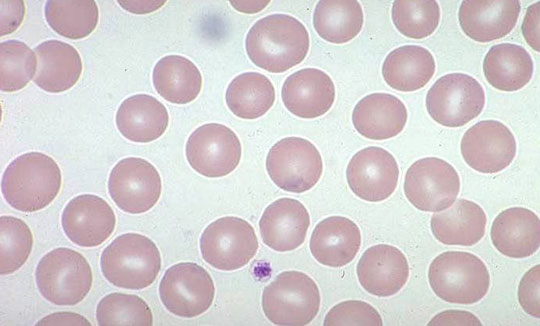Announcing method to reverse leukemia
Scientists at the Royal College of London, UK, have published the latest report related to experimental research on mice.
Experimental results show that inhibiting the role of a certain protein can not only help mice carrying leukemia genes, but also make mice more susceptible to disease. with drugs.

White blood cells.
The report said scientists have found a way to reverse leukemia caused by the MLL gene.
The leukemia caused by the MLL gene accounts for about 70% of children with leukemia and accounts for about 10% in adults with acute leukemia.
During the course of the disease, leukemia precursor stem cells first turn into leukemia stem cells. Then leukemia stem cells continue to turn into leukemia cells and eventually cause leukemia.
Research by scientists found that leukemia stem cells do not always turn into leukemia stem cells. Leukemia precursor stem cells only turn into leukemia stem cells under the action of a protein called Beta-catenin.
If inhibiting the role of beta-catenin protein, leukemia stem cells can reverse and turn into leukemia precursor stem cells. This means reversing the progress of leukemia.
Experimental results in mice showed that if a complete inhibition of the beta-catenin protein, even if the mice had MLL genes, they would not develop leukemia. In addition, test results for in vitro leukemia cells also showed that, after inhibiting the role of the beta-catenin protein, the growth ability of leukemia cells decreased. .
According to scientists, experiments show that the protein Beta-catenin does not affect normal cells. If it is possible to successfully study inhibitors of the beta-catenin protein, this will help improve the effectiveness of treatment for leukemia.
Next step, scientists will continue to study the mechanism of action of beta-catenin protein, thereby studying and applying this method in the treatment of other leukemia.
- The only girl in the world who has 2 leukemia
- Korea prepares new drugs to treat leukemia
- Leukemia is caused by genes
- How dangerous is diphtheria?
- Detection of risk of leukemia due to low dose radiation
- Things to know about blood cancer
- The most common cancer in children turns out to be preventable
- New drugs treat leukemia rarely in humans
- X-rays and leukemia
- Signs of identification and prevention of diphtheria
- Try using green tea extract to treat blood cancer
- Announcing the method of cleaning up radiation in Fukushima
 Green tea cleans teeth better than mouthwash?
Green tea cleans teeth better than mouthwash? Death kiss: This is why you should not let anyone kiss your baby's lips
Death kiss: This is why you should not let anyone kiss your baby's lips What is salmonellosis?
What is salmonellosis? Caution should be exercised when using aloe vera through eating and drinking
Caution should be exercised when using aloe vera through eating and drinking Korea prepares new drugs to treat leukemia
Korea prepares new drugs to treat leukemia  Vitamin D deficiency makes leukemia worse
Vitamin D deficiency makes leukemia worse  The twins help find the culprit causing white blood disease
The twins help find the culprit causing white blood disease  Arsenic helps prolong life for leukemia patients
Arsenic helps prolong life for leukemia patients  Zebra fish help cure blood cancer
Zebra fish help cure blood cancer  The first baby escapes blood cancer through genetic modification
The first baby escapes blood cancer through genetic modification 